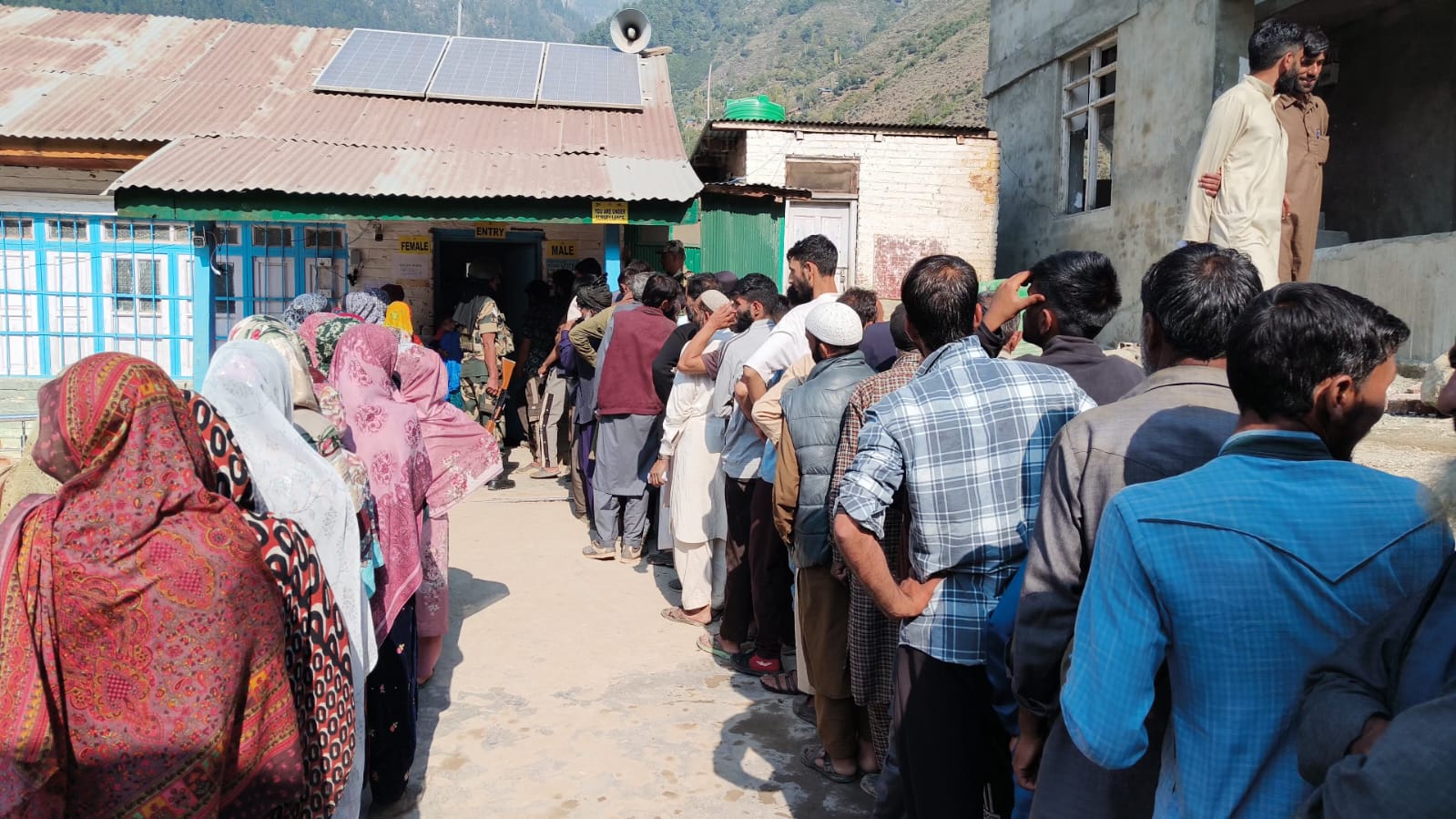Enthusiastic Voting, Creative Floating Polling Stations Mark J&K Elections’ 2nd Phase

Tauseef Ahmad, TwoCircles.net
Srinagar: For 25-year-old Asiya Khursheed, the second phase of ongoing assembly election in Jammu and Kashmir that held today (September 25) represents more than just her first voting experience; it embodies a hopeful opportunity for change. Having completed her post-graduation last year, she has applied for several government jobs over the past five years but remains unemployed, despite achieving scores as high as 70%. Unfortunately, her name has never appeared on any selection lists.
The reservation quotas have created significant barriers for youths like her from the general category, complicating their search for government jobs in the Valley.
During the election campaigns, many candidates highlighted the issue of reservation quotas, which have left many educated youths feeling frustrated. They promised to prioritise these concerns if elected. Asiya, like many others, hopes that the next government will address these pressing issues, enabling unemployed youths to find job opportunities.
As she casts her vote at a floating polling station on Dal Lake, Asiya experiences a blend of hope and uncertainty. She believes this election could mark a turning point for herself and many others in the Valley who are struggling to secure their futures.

Second Phase of Polls in J&K
In the second phase of the polls, voter enthusiasm remained robust across the Kashmir, which a recorded a turnout of 54.11%. Several areas in the region, where election boycotts had once been commonplace, saw a slight uptick in participation.
Following an impressive 60% turnout in the first phase, residents of Srinagar were observed patiently queuing to cast their votes and make their voices heard.
Approximately 2.5 million voters are registered across six districts, including Reasi, Rajouri and Poonch in Jammu as well as Ganderbal, Srinagar and Budgam. A total of 239 candidates, including former Chief Minister Omar Abdullah and Congress chief for the Kashmir region, Tariq Khara, are contesting in 26 assembly constituencies.
Special Polling Stations
A total of 3,502 polling stations were established for the second phase, including several special polling stations marked in pink, green and yellow. Three floating polling stations were also set up on Dal Lake.
An official stated that the government had made every possible arrangement to ensure voter access throughout the region. These elections are viewed as critical for restoring full democratic governance.
“I cast my vote for the first time at the floating post office. Before this, we had to travel to the nearest village to vote. We have lived on the Dal Lake in Shikaras for the last two decades,” shared Aslam, a resident who voted at the floating polling station.
He emphasised that this was only the second time a floating polling station had been set up, following the parliamentary elections, and noted that it would significantly increase voter turnout among residents who previously faced challenges due to long distances to polling centers.
“We used our own Shikaras to travel from our houseboats to here. These steps promote our culture and provide opportunities for all those living in Shikaras to cast their votes,” he added.

Unemployment – a Big Issue
“We have many scholars who are unemployed and working on the streets. Thousands of youths in the Valley, despite holding top degrees, struggle to secure even a peon position in the government sector. Unemployment is a major issue, and that’s why we are casting our votes today,” remarked Rashid Fayaz, 28.
He expressed hope that the return of democracy would prioritise these pressing issues.
Another first-time voter from Srinagar stressed the importance of every vote, stating, “Since 2019, the youth have suffered the most in the Valley. There are no available positions for 4,000 posts in the Jammu Kashmir police, yet more than 3 lakh people have applied. Many of us are working for less than six thousand rupees in private sectors.”
She added general category students have faced the brunt of the situation since the abrogation of Article 370. “The government has added lakhs of people to reservation quotas, making it nearly impossible to secure government jobs. We hope that once a government is formed, these issues will be discussed, offering us some relief.”
Abrogation of Article 370
“Since the abrogation of Article 370 five years ago, we have been directly controlled by Delhi. Now, people want their own representatives who will listen and resolve their basic issues,” said Mohammad Afzal Khan.
He noted that many areas still lack essential facilities, adding that their voices had gone unheard under the direct rule. Residents hope these issues will finally be acknowledged and addressed.
“By choosing our candidates, our voices can be heard. It was nearly impossible for the poor to get their concerns recognised under direct governance,” said another voter, Mir Mushtaq.
He further lamented, “From 10 kg of rice, we now receive only 5 kg per person for a month. How can one manage on that? The government has made us suffer for essential items like rice. We are in pain, and that is evident in these long queues filled with hope for change through our votes.”
[caption id="attachment_450469" align="aligncenter" width="912"] Source: Information and PR J&K[/caption]
Source: Information and PR J&K[/caption]
From Boycotts to Long Queues
In a notable shift, many areas in Srinagar that were previously known for election boycotts experienced increased voter turnout. However, the Habakadal constituency recorded a lower turnout compared to previous elections. In the last assembly polls of 2014, voter turnout in Habakadal was just 21.30%.
“Since 2008, this is my first time casting my vote. We achieved nothing with boycotts. We hope this time our votes will effect change in the region,” said Manzoor Ahmad, a resident of Ganderbal.
Chief Electoral Officer PK Pole addressed the media, stating that a turnout of 56.05% was recorded, and the second phase of elections concluded peacefully across all constituencies.
